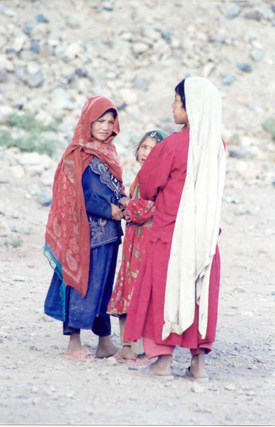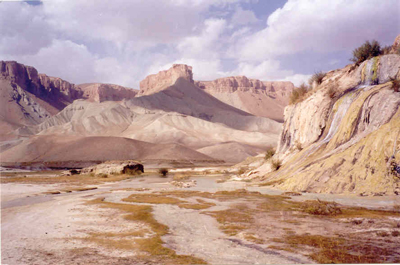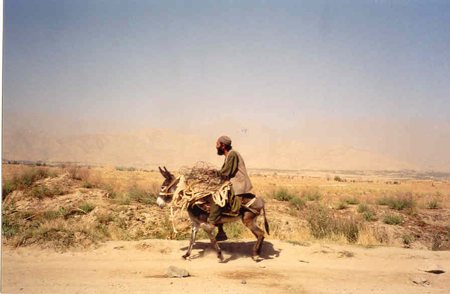October 15, 2003
Kabul Letter Number Two
August 11, 2003
Dear Thomas,
All is well, despite a slight stomach upset and a general tiredness caused by the shortage of oxygen, which I am still not used to. I am also woken every morning at 4.30 am by the call to prayer. ‘Prayer is better than sleep,’ which is true, but I never really get back to sleep.
Yesterday was the most interesting day yet. Our driver Razoul, who is becoming a friend, drove me south out of the city to the former Royal Palace of the former king, who was crowned in 1933 and is still alive and now living back in Kabul. It is a ruined shell, but still a grand building. The avenue down to the Palace is lined with destroyed buildings, as this was one of the most the most heavily fought-over areas. It is also where the Hazara people live, who are a Mongol people said to be the descendants of Genghis Khan’s Golden Horde. This makes them stand out in what is mostly an Aryan country. They are also Shiite, and they have always been seen as outsiders by other Afghans. Under the Taliban a slow policy of extermination was implemented against them.

Razoul also took me to his old school. It had been used as a base for fighting during the war, and there are traces of mortar attacks everywhere. Bullet holes still grace the walls. I even saw a Russian shell-casing lying on the ground. All the windows have been blown out, and people have come to remove the electric wiring, in order to sell it. The extraordinary thing is that the school is still in use. The classes have timetables on the walls, with Physics, Biology, English and Arabic all being taught in the ruined premises. Razoul said that when he was a student there, there weren’t any chairs and he had to crouch during the lessons. We stood in this ravaged building and the mountains stretched into the distance all around us, great bare silent witnesses to the brutality that the Afghans have meted out to each other. In many ways the best thing about this visit was to see the land stretching away into the distance: Kabul quickly becomes quite claustrophobic, with the dust and the smell and the people, and it was good to be able to lift my head up at the mountains.

From the school I saw a completely contrasting sight nearby, a very large walled garden at the foot of one of the nearer hills, with rows of flowers surrounded by a long wall of pointed arches. These are the Gardens of Babur, which contain the grave of Babur, the founder of the Moghul Empire and the greatest Afghan in history—though in fact he wasn’t an Afghan at all, but an Uzbek. He was a descendant of Tamerlane and originally came from the Ferghana Valley in Uzbekistan. He was denied his inheritance in his youth, so he travelled south to Kabul and captured the city. From here he invaded India and went on to create an Empire that stretched to Calcutta, with its capital at Delhi. Kabul remained his greatest love, though, and after he died he asked to be buried here. He gave instructions that he have no tomb, for he wanted flowers to grow from the earth that held him, but his grandson constructed one with the following inscription:
‘Only this mosque of beauty, this temple of nobility, constructed for the prayer of saints and the epiphany of cherubs, was fit to stand in so venerable a sanctuary as this highway of archangels, this theatre of heaven, this light-garden of the God-forgiven angel king whose rest is in the Garden of Heaven, Zahirrudin Mohammed Babur the Conqueror.’
The gardens are being restored after years of destruction and neglect. Two of my students are working on the project, and they were there when I visited and invited me for tea in their tent in the garden. Afghan tea is a green tea flavoured with cardamom, drunk without sugar, and is very delicious, much better than Turkish tea. We sat and talked about Afghanistan, about the war, the Russians, how they feel about each other and about the foreigners in their country now. We talked for an hour, so I can’t report it all, but they all said that they were glad to have foreigners here to help them, but if the foreigners begin to use guns to gain power over them, then they will resist them with force. They also said that they didn’t like the soldiers who teased their ‘girls’ (I understood this word as ‘guards’ for a while, and I couldn’t see why the soldiers would tease their guards, but the misunderstanding was cleared up). In fact I find it very hard to believe that anyone would tease Afghan women: it is obviously unacceptable here, and profoundly provocative. But the general message was that foreigners were welcome, and they all assured me that nothing would happen to me here in Kabul; it is only in the south of the country that one needs to take care. We shall see.

After this most interesting visit I returned to the city to teach a lesson to my group of architects and restorers, including the ones I had just seen at the Gardens. This is a class of about ten students, and the more I get to know them the more I discover how various the ethnicities of Afghans are: Pashtun, Tajik, Hazara and others speaking Persian, Pashto, Urdu, Baluchi, Hazaragai, Uzbek and Turkman. In the class there was much laughter and teasing about their differences—I am always aware, however, that they were killing each other not so long ago, and so try to keep a watch on where the conversation is going. Every so often a slightly threatening tone emerges. But it really does seem that the Afghans lived in harmony from about 1919 to 1978, until foreign powers intervened with their money and their weapons, first the Russians, then the USA and the Pakistanis, the Iranians and the Saudis. And the country has suffered terribly. In fact I think this is a very spiritual and non-materialistic people, which must be partly why they were able to fight so resolutely and successfully against the Russians. But the experience of fighting outsiders seems to have given them a taste for it, and led to their fighting each other. The destruction and psychological trauma is very great. Yet I think to have come here in the 1960s must have been quite wonderful. I will try to visit some of the country before I leave.
All for now. I hope all is well.
Andrew
I so enjoy your friend's observations of Kabul. Do continue posting the letters!
Posted by: robyn at October 15, 2003 10:18 AMI shall do. You might want to go back and take another look at the two I've already posted, as I have added some pictures Andrew took while he was there.
Posted by: djsmall at October 15, 2003 02:45 PMAre these emails, or actual letters received through the mail? I am unable to picuture Andrew as having enough time or technology to spend long lengths of time on a computer.
Posted by: robyn at October 17, 2003 12:55 AMBelieve it or not, they are emails. And I've personally witnessed Andrew receive emails from and send emails to Afghanistan since returning to Greece. He was working for the University of Kabul while he was there, so I suppose it isn't so suprising that he had access to the Internet. But as for how some of his Afghan buddies get online... Three cheers for the fruits of American imperialism, anyone?
Posted by: djsmall at October 17, 2003 02:21 AM